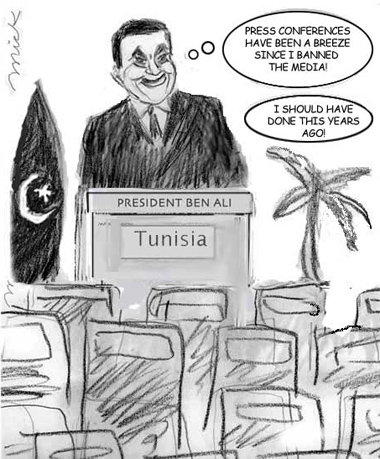Gag order lifted in Israeli military leaks case
The Committee to Protect Journalists issued the following statement after learning that a months-long gag order was lifted today. The gag order prevented Israeli media from reporting on the case of a soldier charged with “harming national security” who is under house arrest for leaking documents that allegedly show that the military violated an Israeli…
Fiji’s draft media decree threatens long-term restrictions
New York, April 7, 2010—Fiji’s military regime should withdraw a draft decree that would regulate media ownership and news content, while authorizing the imposition of fines and prison terms for violations, the Committee to Protect Journalists said today.

A distorted picture from Iraq
The Iraqi government is keeping photographers away from scenes of suicide attacks, according to a piece published today by Stephen Farrell on The New York Times’ “At War” blog. CPJ has objected to government regulations promulgated in May 2007 barring photographers from the scene of such bombings for an hour after they take place.

A perfect press conference in Tunisia
The government of President Zine El Abidine Ben Ali has made it clear there is little room for a critical press in Tunisia. Taking a cue from the government’s recent anti-press actions, CPJ cartoonist Mick Stern imagines the president’s “ideal” press conference. See more Mick Stern cartoons.

China imposed strict controls on Google coverage
Our friends at China Digital Times have translated recent orders from China’s State Council Information Office to domestic news organizations and Web sites about how to handle the country’s ongoing dispute with Google. We’re posting an excerpt here, but please read the whole link. There’s a great discussion about government censors’ plans for monitoring social…
Tunisia blocks journalists from press conferences
New York, March 25, 2010—Tunisian authorities banned journalists from attending two press conferences for the launch of local and international human rights reports this week, and is stepping up harassment of journalists overall, the Committee to Protect Journalists said today.

Google’s Chinese wake-up call
On Monday, Google made good on its promise to stop censorship of its Chinese search engine, Google.cn, by rerouting viewers to its unfettered Hong Kong site. According to the company’s chief legal officer, David Drummond, the move was “a sensible solution to the challenges we’ve faced—it’s entirely legal and will meaningfully increase access to information…

Circumventing India’s radio news ban
Violence against provincial journalists, self-censorship, and the rise of paid news were the leading press freedom concerns cited by editors and journalists that I met with during my recent visit to India. But for Shubhranshu Choudhary, known as Shu, it’s the ban on radio news that most concerns him. He believes the ban is fueling India’s long-simmering Maoist insurgency,…
